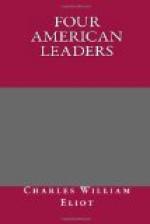By inheritance and by marriage Washington became, while he was still young, one of the richest men in the country; but what a contrast between his sort of riches and our sorts! He was a planter and sportsman—a country gentleman. All his home days were spent in looking after his farms; in breeding various kinds of domestic animals; in fishing for profit; in attending to the diseases and accidents which befall livestock, including slaves; in erecting buildings, and repairing them; in caring for or improving his mills, barns, farm implements, and tools. He always lived very close to nature, and from his boyhood studied the weather, the markets, his crops and woods, and the various qualities of his lands. He was an economical husbandman, attending to all the details of the management of his large estates. He was constantly on horseback, often riding fifteen miles on his daily rounds. At sixty-seven years of age he caught the cold which killed him by getting wet on horseback, riding as usual about his farms.
Compare this sort of life, physical and mental, with the life of the ordinary rich American of to-day, who has made his money in stocks and bonds, or as a banker, broker, or trader, or in the management of great transportation or industrial concerns. This modern rich man, in all probability, has nothing whatever to do with nature or with country life. He is soft and tender in body; lives in the city; takes no vigorous exercise, and has very little personal contact with the elemental forces of either nature or mankind. He is not like Washington an out-of-door man. Washington was a combination of land-owner, magistrate, and soldier,—the best combination for a leader of men which the feudal system produced. Our modern rich man is apt to possess no one of these functions, any one of which, well discharged, has in times past commanded the habitual respect of mankind. It is a grave misfortune for our country, and especially for our rich men, that the modern forms of property,—namely, stocks and bonds, mortgages, and city buildings—do not carry with them any inevitable responsibilities to the state, or involve their owner in personal risks and charges as a leader or commander of the people. The most enviable rich man to-day is the intelligent industrial or commercial adventurer or promoter, in the good sense of those terms. He takes risks and assumes burdens on a large scale, and has a chance to develop will, mind, and character, just as Queen Elizabeth’s adventurers did all over the then known world.




